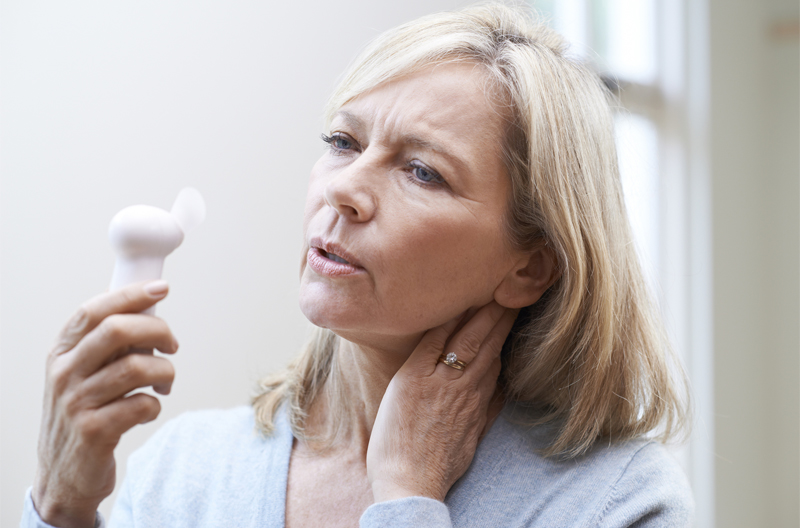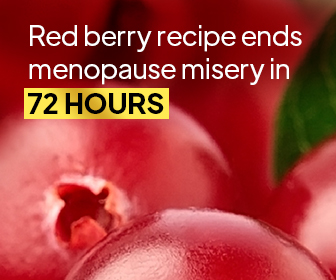Hot flashes. Night sweats. Mood swings. Headaches. When you’re going through menopause, every part of your day-to-day life is affected. Dealing with the symptoms of menopause can be a struggle, especially when you’re unsure of where to turn. If you’re looking for some much-needed relief, why not try some natural remedies for menopause side effects? Let’s take a look at what you can expect and how you can get started sooner rather than later.
What is Menopause?
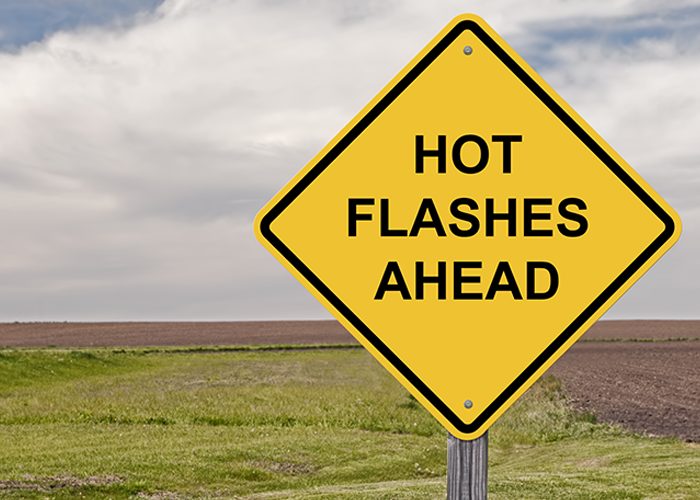
Put simply, menopause is the point at which women stop having periods and menstruating. It is caused by a natural drop in hormones called estrogen. Menopause usually affects women between the ages of 45 and 55, however, in some rare cases it can begin at an earlier point.[1] Thankfully, there are some natural remedies for menopause you can try when you first start experiencing it.
Fact: Did you know one in every 100 women will experience
an “ early menopause”?[2]
It’s important to remember that the stages of menopause are a completely natural part of the aging process and something that all women go through. Your ovaries will stop producing as much estrogen as they once did, which will, in turn, lead to other menopause side effects. You will also stop menstruating which means that your ovaries will no longer release an egg each month and you cannot get pregnant.[3]
Around 1% of women will go through an “early menopause”, i.e. one that starts before the age of 40 years old.[4] Menopause can also be caused by medical conditions and illnesses. For example, in some cases, breast cancer treatments such as radiotherapy and chemotherapy can trigger the onset of early menopause. Equally, conditions such as Addison’s disease and Down’s syndrome can be the cause of starting this change earlier than usual.[5]
The 3 Stages of Menopause
You won’t go through menopause overnight. The fact of the matter is that this change in your fertility levels will take years to complete. While women’s experiences may differ depending on their health, there are three stages of menopause that you should know about. The Women’s Health Research Institute at Northwestern University defines the main menopause stages as the following:[6]
Stage One: Perimenopause
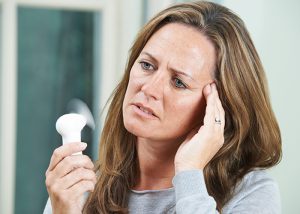
early menopause”, i.e. one that starts before the age of 40 years old.
You might be wondering what will happen during the stages of menopause. The first stage is the perimenopause. This can start between three and five years before your body starts to go into full menopause. It’s most likely that you will begin experiencing the symptoms of this stage when you’re in your late 40s and beyond.
At this point, you will find that your periods become more irregular and unpredictable. You may also start to experience bouts of the major menopause side effects. Some of these typically include hot flashes, mood swings, trouble sleeping, vaginal dryness, anxiety, depression, and night sweats. You may be able to combat these symptoms using some natural remedies for menopause.
Despite the fact that your body will be producing lower levels of estrogen and your fertility levels will decrease, it is still possible to get pregnant during this stage. For that reason, if you don’t want to have a child, you should use your regular form of birth control.
Stage Two: Menopause
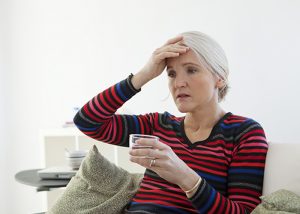
The second of the stages of menopause is the main event. When you have missed your period for more than a year, you are officially going through menopause. It can take up to three years to go through all of the stages of menopause. When you hit this particular stage, the chances are that you will also experience some of the most common menopause side effects.
However, every woman is different and some women experience few or even none of these symptoms. Should you find that you start to notice odd side effects or need extra guidance in this area, it is wisest to speak to a medical professional. They will be able to advise you on what the right course of action or treatment is for you.
Stage Three: Post-Menopause

After the main menopause stage and when your periods have completely stopped, you will reach the post-menopause stage. Despite the name of this stage, you should note that you will likely still experience menopause side effects at this point.
Fact: Post-menopausal women could be at higher risk of suffering from medical conditions including heart disease.[7]
The symptoms that started during either perimenopause or menopause may well continue through this particular stage. For that reason, you may experience hot flashes, a fast heart rate, night sweats, mood changes, vaginal dryness, depression, and anxiety. Again, you can try some natural remedies for menopause to help combat these problems. The lower levels of sex hormones in your body also mean that you could be at higher risk of suffering from conditions such as heart disease, osteopenia, and osteoporosis.
What Are Some Side Effects to Be Aware of?
Going through menopause can be difficult and harrowing. One of the biggest obstacles women come up against is the array of menopause side effects. These symptoms can affect you in all the stages of menopause and may impact your life negatively. Here are some of the most common menopause side effects according to the National Health Service (NHS):[8]
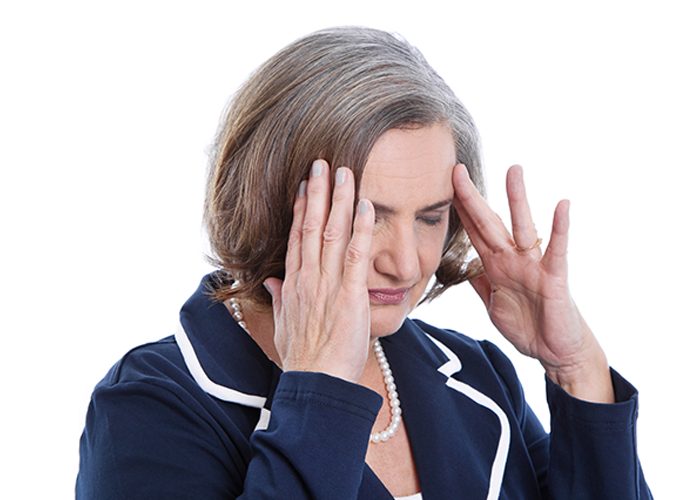
Headaches
Many women experience headaches during menopause. You may find that these come on at the same time each day or irregularly. Should you find that you have headaches frequently, you might want to talk to your doctor about the issue.
Hair Loss
One of the more troubling menopause side effects is hair loss. This symptom could make you feel self-conscious about your appearance and may impact your self-esteem too. Again, you can speak to your doctor about possible treatments and how to cope.
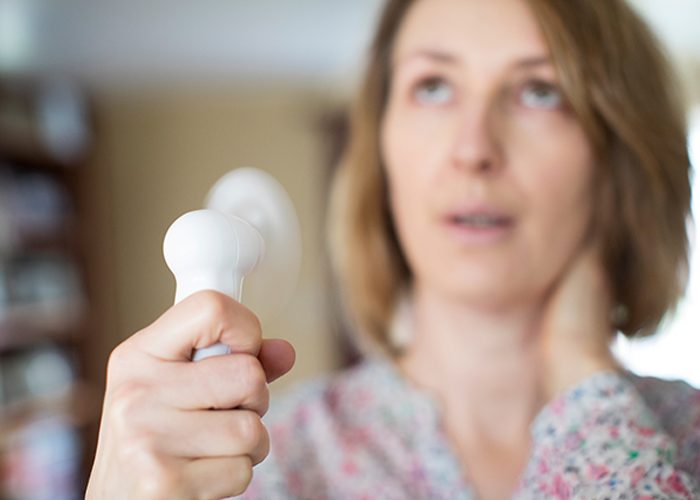
Hot Flashes
One of the most common menopause side effects are hot flashes. The feverish heat can come on at any point and make you feel extremely hot. You may find that you also sweat during a hot flash episode. Luckily, there are plenty of natural remedies for menopause that can help you deal with hot flashes.
Night Sweats
In simple terms, night sweats occur when you have a hot flash during the night. You may notice that there is sweat or a wet patch on your sheets in the morning.
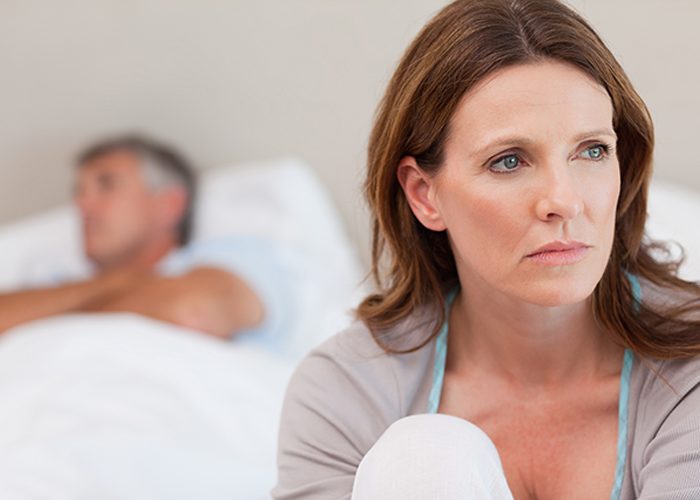
Low Sex Drive
A loss of libido is usually a part of menopause. The issue can cause relationship problems and be embarrassing for women.[9] However, you should note that this is one of the natural side effects of menopause.
Palpitations
As we have already mentioned, an elevated heart rate is one of the main menopause side effects. In some cases, this problem can lead to palpitations, which is a heartbeat that suddenly gets faster or more noticeable.
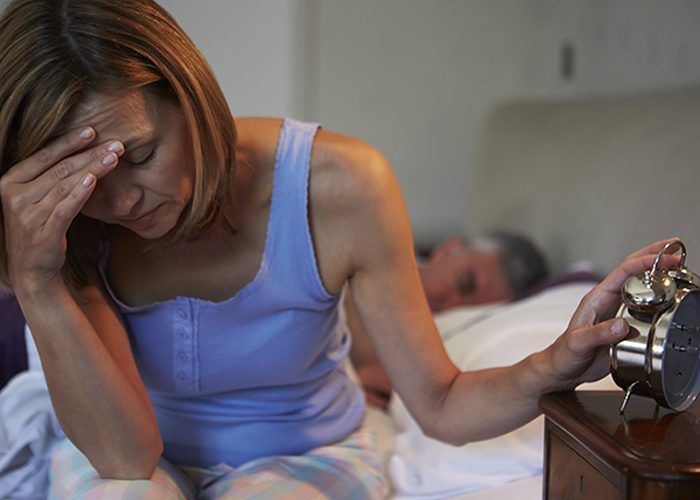
Sleep Problems
Do you have trouble dropping off to sleep? Many women who are going through menopause experience issues when falling to sleep or short bouts of insomnia. These problems can lead to tiredness and irritability during the day. Of course, you can try some natural remedies for menopause to help you get more sleep.
Fact: Did you know that stress could make your menopause side effects worse?[10] Try some mindfulness to unwind and de-stress!
Regular Urinary Tract Infections (UTIs)
You may also find that you suffer from regular urinary tract infections (UTIs) during the perimenopause or menopause. You should consult your doctor should you find that this is an issue for you.
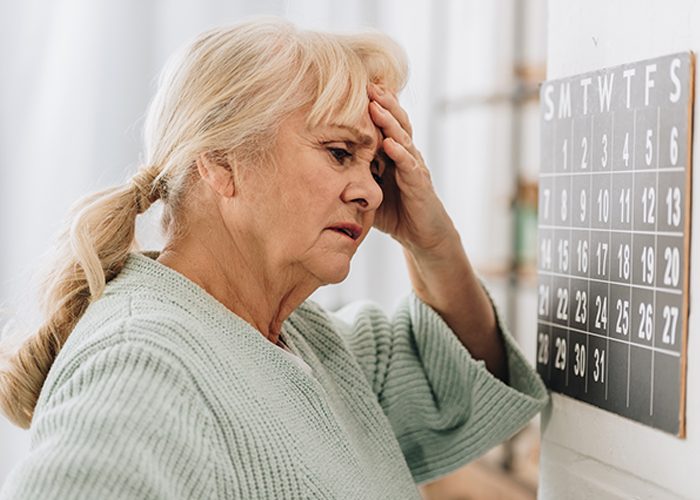
Issues with Memory and Concentration
Perhaps one of the more surprising menopause side effects is categorized by a lack of concentration and even memory issues. When you start to experience these symptoms, you may want to keep track of them and talk to your doctor too.
Vaginal Bleeding After Menopause
After the main menopausal stage, when you’re in the post-menopause stage, you may experience yet more side effects. One of the most worrying is vaginal bleeding after menopause or postmenopausal bleeding.[11] When you experience this problem, you should see a doctor right away. While most of the time this symptom is not cause for concern, it could be a sign of cancer.[12] It’s best to get checked sooner rather than later.
7 Natural Remedies For Menopause Side Effects
When you’re going through the change, you will want some relief from menopause side effects. Your doctor may offer you Hormone Replacement Therapy (HRT), which replaces your hormone levels during menopause.[13]
You can either have the combined HRT, which replaces both estrogen and progestogen, or the estrogen-only HRT. You should discuss the options with your doctors. One of the major drawbacks of HRT is that it can increase your risk of womb cancer and lead to side effects, including vaginal bleeding, headaches, and a risk of blood clots.
For that reason, many people prefer to opt for natural remedies for menopause side effects. There are loads of holistic ways in which you can combat some of the major symptoms of menopause. If you’re not sure where to start, we’ve got some options for you. With that in mind, here are some of the most effective, science-backed natural remedies for menopause.
1. Soy

Adding soy to your diet could be a smart way to handle some of the major menopause side effects. Research from The North American Menopause Society (NAMS) suggests that eating soy-based products could lead to fewer hot flashes for some women.[14]
However, these natural remedies for menopause side effects only work for certain people. Whether soy is an effective remedy for you will depend on whether your body can produce soy metabolite equol, according to the experts.[15] Around 20-50% of women are able to do so, which means there’s a decent chance that eating soy will slow your hot flashes down.
2. Stress Reduction
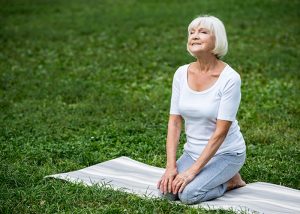
While stress is not to blame for your menopause side effects, there’s a decent chance that it’s exacerbating them somewhat. Another report from The North American Menopause Society (NAMS) suggests that lowering stress levels could be one way in which women can curb some of the symptoms, such as hot flashes.[16] Needless to say, reducing your stress levels is often easier said than done. However, there are some tricks you could try.
Taking some time to relax at the end of the day could be what it takes to de-stress. Many people also find relief in mindfulness techniques, such as meditation, yoga, or simply reading. You could also try some breathing techniques to relieve stress and anxiety.[17] Taking control of your stress levels will not be easy but it’s a worthwhile goal.
Fact: Did you know that practicing yoga could help improve your mood and decrease anxiety levels?[18]
3. Black Cohosh
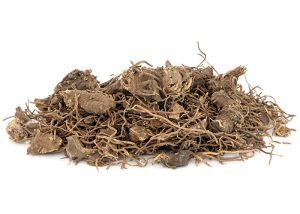
One of the best natural remedies for menopause symptoms could be black cohosh. Research suggests that taking this supplement, which you can buy at most health food stores, could help to decrease the number and severity of hot flashes that menopausal women have.[19] The study looked at the effect that the consumption of the herb had on 80 different women, all of whom were going through menopause.
Of course, if you want to add black cohosh to your diet, you should consult with a medical professional. Ensuring that you take the right dosage is essential to maintaining a good level of day-to-day health. Much of the time, you will find guidance on the packaging of the supplement, which you should follow closely. Should you start to experience any negative side effects when taking the herb, you need to stop and talk to your doctor.
4. Mindfulness and Meditation
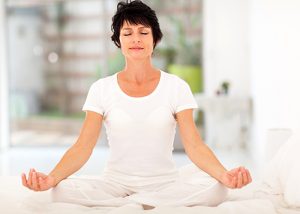
Self-care is a hot topic at the moment and it’s extremely important during menopause. Using mindfulness techniques could be one way to deal with some of the major menopause side effects, such as hot flashes and night sweats. Research suggests that using Mindfulness-Based Stress Reduction (MBSR) lowers the level of distress and bother that women feel as a result of the symptoms of menopause.[20]
Starting some mindfulness practices can improve your quality of life. You could either join a class, watch Youtube videos, or download an app that teaches you the practice. At first, it could be hard to start this technique but with a little patience and concentration, it can be a huge benefit to your life. For example, you might find that the Headspace app is a useful tool to get you started. Give it a go and see whether it makes any difference.
5. Yoga

Similarly, you might find that yoga helps you to deal with some of the trickier menopause side effects. One study from the Boston University Medical Center has found that engaging in yoga can have a positive effect on both a person’s mood and their levels of anxiety. [21] While the researchers suggest that this could be a potential form of therapy for mood disorders, it could also be one of the best natural remedies for menopause.
Since going through menopause ultimately affects how you feel and can lead to erratic swings in your mood, practicing yoga could be the way forward. You may want to start your journey by reading about beginner’s yoga online or watching some handy tutorial videos. There are many different types of yoga in which you could engage, but at first, it’s worth simply getting the basics right before you progress.
6. Pine Bark Extract
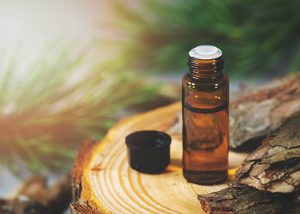
One of the most notable natural remedies for menopause side effects has to be French maritime pine bark extract, also known as Pycnogenol. In one trial menopausal women were treated with 30g of the supplement twice a day for three months.[22] The results suggested that this treatment improved some of the major menopause symptoms including hot flashes.
If you’re thinking about giving this particular treatment a whirl, it couldn’t be easier. You can buy French maritime pine bark extract at health stores and online. However, it’s important to note that this extract should only be taken in small doses. Read the instructions on the packaging and avoid taking the supplement too often or you could have side effects.
7. Ginseng Root
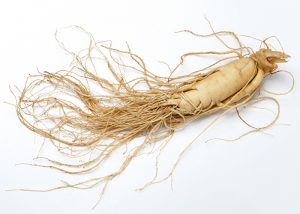
Having trouble sleeping as a result of menopause? This common side effect can have a negative impact on your daily life. Why not tap into the amazing health benefits of ginseng? Research suggests that ginseng root could help people with sleep problems and improve their overall quality of sleep each night.[23] With that in mind, it could be worth trying this supplement before you hit the hay. You can get ginseng root extract or even ginseng root tea instead. Drink up!
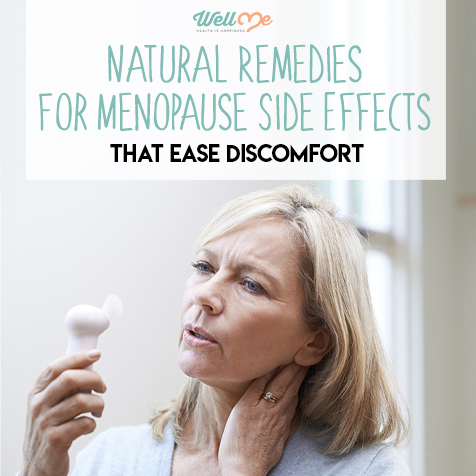
Conclusion
Going through menopause can be a struggle, but you should remember that you’re not alone. This is something that affects every woman. It may help to talk to those around you and share your experiences. Plus, using natural remedies for menopause could help you to curb some of the more troublesome side effects. Give these remedies a go for yourself and see whether they make a difference. Of course, if you find that menopause side effects are getting worse, it’s a good idea to consult a doctor.
References
- [1] https://www.nhs.uk/conditions/menopause
- [2] https://www.nhs.uk/conditions/menopause
- [3] NHS. https://www.nhs.uk/conditions/menopause
- [4] https://www.nhs.uk/conditions/menopause
- [5] https://www.nhs.uk/conditions/menopause/
- [6] Northwestern University. http://menopause.northwestern.edu/content/stages-menopause
- [7] http://menopause.northwestern.edu/content/stages-menopause
- [8] https://www.nhs.uk/conditions/menopause/symptoms
- [9] NHS. https://www.nhs.uk/conditions/loss-of-libido
- [10] https://www.menopause.org/for-women/menopauseflashes/mental-health-at-menopause/stress-getting-serious-about-solutions
- [11] https://www.nhs.uk/conditions/post-menopausal-bleeding
- [12] NHS. https://www.nhs.uk/conditions/post-menopausal-bleeding/
- [13] https://www.nhs.uk/conditions/menopause/treatment
- [14] http://www.menopause.org/docs/default-source/2014/soy-vms-equol.pdf
- [15] NAMS. http://www.menopause.org/docs/default-source/2014/soy-vms-equol.pd
- [16] http://www.menopause.org/docs/default-source/2015/nonhormonal-hot-flash-therapy.pdf
- [17] https://www.menopause.org/for-women/menopauseflashes/mental-health-at-menopause/stress-getting-serious-about-solutions
- [18] Journal of Alternative and Complementary Medicine. https://www.liebertpub.com/doi/10.1089/acm.2010.0007
- [19] https://www.ncbi.nlm.nih.gov/pmc/articles/PMC5868221
- [20] https://www.ncbi.nlm.nih.gov/pmc/articles/PMC3123409
- [21] Journal of Alternative and Complementary Medicine. https://www.liebertpub.com/doi/10.1089/acm.2010.0007
- [22] https://www.ncbi.nlm.nih.gov/pubmed/23447917
- [23] https://www.ncbi.nlm.nih.gov/pubmed/23872254

